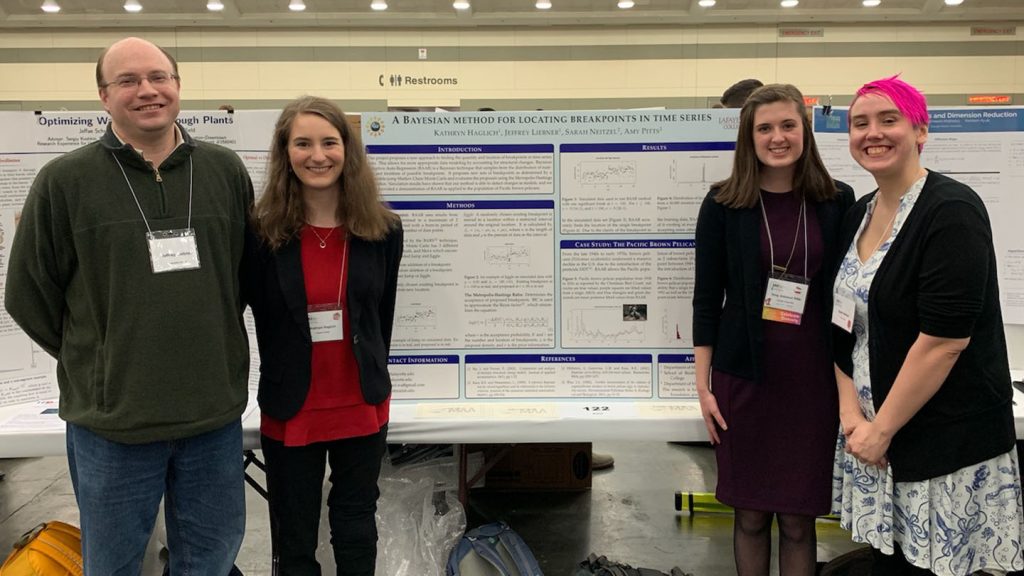“It was amazing to see how our research was starting to help inspire others make their own discoveries.”
By Katie Neitz
Lafayette mathematics majors recently had the opportunity to present their research at a prestigious international conference.
Several students and faculty mentors traveled to Baltimore in January to attend the Joint Math Meeting (JMM), the largest gathering of math scholars in the world.
Keith Vreeland ’20 and Elene Karangozishvili ’21 shared research findings they gathered on campus while working with Professor Gary Gordon and Associate Professor Derek Smith, respectively, as EXCEL Scholars. Kathryn Haglich ’19 presented research she conducted as a participant in the math department’s annual summer REU program under the advisement of Associate Professor Jeffrey Liebner.
Vreeland researched the “leafiness of trees,” an aspect of graph theory; Karangozishvili investigated the shortest paths in generalizations of the Cantor Set; Haglich was part of a collaborative statistics project aimed at detecting breakpoints in time-series data.

Kathryn Haglich (Lafayette), Amy Pitts (Marist College), and Sarah Neitzel (Unity College) presented research from their statistics REU project, led by Professor Jeff Liebner.
Here, Haglich shares five key takeaways from her JMM experience:
Math, Math, and More Math: “I went to at least 20 talks,” Haglich says. “One ends, and you find another that interests you whether you know anything about the topic or not. I spent 90 minutes at a session focused on statistical research. It was a beautiful way to spend a Saturday afternoon.”
Contributing Knowledge: “It was really nice to have our professors and friends there to listen to us present our research,” she says. “But it was really amazing that about half the audience included people who saw our abstract and thought it was interesting enough to attend. After we presented our research, several audience members came up to talk with us. They were very interested in our research and asked us for our model’s code, wanting to implement it themselves. It was amazing to see how our research was starting to help inspire others make their own discoveries.”
Questioning, Asking, Learning: “I learned not only more about math, but also about how to be a better mathematician,” she says. “I didn’t understand everything presented, but I realized that was OK. You always should be curious about whatever field you are studying, even if it may seem daunting at first. Attending the conference showed me the value of curiosity, about going to a talk and learning something new, and to keep questioning and learning. Additionally, I learned the importance of being an effective leader, someone who helps other mathematicians succeed in the field as well.”
Valuable Interaction: “The very last talk I went to was given by Cathy O’Neil, who wrote Weapons of Math Destruction, she says. “It’s about how algorithms affect democracy, and how our biases can play a role in our data analyses. I read the book for class and felt very disheartened—I was seeing the dark side of my field. I spoke to her after her talk and asked her if she saw any hope. She said, ‘yes’—but we have to be aware of the ethics incorporated into the algorithms and be mindful of how the outcomes unintentionally affect others. I was so grateful to have that opportunity, and that gave me hope that I can take steps in my own career to develop algorithms that benefit society.”
Bonding with Faculty: “I really enjoyed getting to know the professors better. We went out to lunch and dinner together and talked with each other about math—but also about things besides math. The professors in the math department have a really nice camaraderie with each other, and they warmly welcomed us into that fold. As a result, we’re not just a lecturer and a name on a homework assignment; we’re mathematicians and statisticians who have a common appreciation for this beautiful field.”
